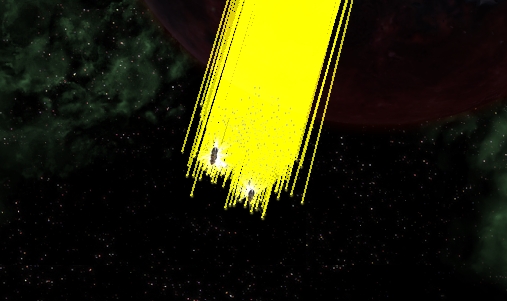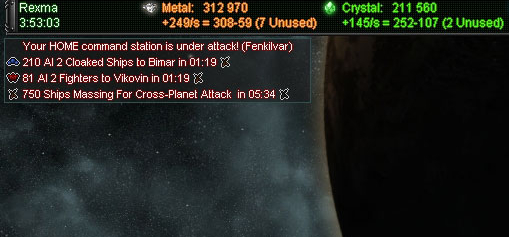
A team's fleet is on the move to take out the enemy
Once you’re in the game, players will likely spend the first few minutes establishing a firm foothold in their starting areas. From this "home base", you slowly begin your expansion outwards, fighting the AI tooth-and-nail for every planet. While the AI doesn’t need the resources from the planet in order to win, you wouldn’t guess that was the case from the way it can staunchly defend its property. To compound the issue further, as you expand your empire, the AI opponents become more aggressive and attack with greater frequency, so taking a gung ho approach of trying to expand rapidly in order to get a lot of resources will quickly leave you vulnerable and easier to wipe out by a very ticked off AI. Victory in AI War is determined by who can wipe out the other’s home base. If you’re taking on the AI alone, losing this location means you lose the game. You could have dozens of "satellite" bases established across the galactic map, but if your home base is wiped out, that’s it. This is where the co-op aspect really starts to shine. The AI may come and completely destroy your home base, but so long as one other player still has a home base, the team thrives and victory is not written off. Of course, this same rule applies to the two AI opponents you face. Just because you wiped out one of their home bases doesn’t mean the fight is over.
This "down but not out" kind of scenario is possible thanks to the extremely useful feature of being able to gift ships between players. There are very few limitations on the gifting of ships, and those two are set up as "anti-cheat" measures to ensure players aren’t given more ships than they’re allowed or provided access to ships they can’t even build yet, so you’re able to give a friend an entire armada, a new base of operations, and the turrets needed to defend against enemy attacks if he or she needs it. Resources may also be exchanged, but not directly. Instead of giving another player X amount of a resource, you can give them the ships that harvest that resource so they can stockpile it faster. This can be done with no real detriment to your own resource gathering, as all resources, with the exception of knowledge, which is used to upgrade and access new ships, are inexhaustible. This concession seems only fair when you consider that the AI opponents start off in control of all the planets at which you or your partners don’t start.

Now would be a good time to get some help from your buddies
Really, the only downside to this game is the way that co-op games are set up. Understandably, there’s no game listing/hosting as that would require access to a group of servers, so right now, players can connect to one or another locally over a LAN, or remotely by direct IP connection. While anyone who’s spent at least some time setting up a router can likely figure out their router’s IP address without much problem, there are some folks out there that may be at a loss for what to do (ipconfig in the command prompt is your friend). What’s more, if there is some kind of error and players aren’t connecting, debugging the issue might prove problematic. Fortunately, the AI War forum boards are full of helpful folks, including the game’s designer, who are happy to help out. The way connections are handled may also eventually fade with the game’s arrival on Steam, which would be able to provide the servers needed to host games.
The RTS genre has developed quite a bit since the days of Warcraft, the original Command and Conquer, and Total Annihilation. Some RTS games, like Dawn of War II, have dropped the detailed resource, technology, and unit building management that has plagued many an RTS title in favor of a more concise, tactical approach, while others, like the Homeworld series, just add on even more things to keep track of and add an unnecessary degree of complexity. AI War, however, manages to propel the RTS genre forward and beyond its usual trappings with an innovation that is so simple it’s amazing it hasn’t been done previously, while still managing to keep the spirit of those classic RTS games alive. Best of all, it does so with one key element in mind: co-op is not just a bullet point on a box, but a way of designing, creating, and playing games.
Verdict
Co-Op Score
Overall
The Co-Op Experience: 8 players can work together against AI.
Co-Optimus game reviews focus on the cooperative experience of a game, our final score graphic represents this experience along with an average score for the game overall. For an explanation of our scores please check our Review Score Explanation Guide.